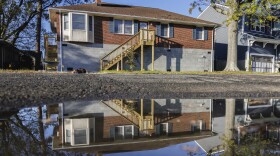The group estimates 1,295 data centers have been built or planned in the state.
-
Is the resilient James a model watershed?
-
The illness is caused by a parasite, which makes it different from many well-known tick-borne diseases, such as Lyme.
-
Take a look at this week's top VPM News stories.
-
The Chesapeake Bay Foundation called the latest numbers “extremely distressing.”
-
Nonprofit GroundworkRVA sees the farm as a way to provide fresh food and life skills.
-
Public meeting highlights in Central Virginia for the week beginning May 27.
-
The city estimates the tax would generate roughly $400K in its first year.
-
The globe’s largest concentration of data centers is in Virginia.
-
Norfolk is considered a national hotspot for sea level rise. Virginia researchers say cities farther south are starting to catch up.
-
To account for immediate tariff impacts, the utility plans to increase customers' monthly energy bills by an average of 4 cents over the life of the project.
-
The National Flood Insurance Program recently made data on repetitive loss properties public for the first time.
-
A MoveOn petition urging its reopening already has 800 signatures.
-
A VCU team is studying how islands off Virginia's Eastern Shore react to changing climate conditions.
-
Multiple attempts to throw out the challenge failed over the summer.
-
Reports like this week’s on the bay’s declining osprey population have garnered attention because of the potential link to controversial industrial menhaden fishing.
-
What we eat plays a role in the health of our environment.
-
Across the Gulf South, small Black-owned farms are finding ways to use climate-friendly practices to grow crops while also addressing long-standing injustices.
-
Federal program subsidizes some weatherization upgrades.
-
From meal kits to grocery service to restaurant delivery, we look at the carbon footprint of convenient food and the choices people can make to try to reduce it. Sometimes there are trade-offs.
-
Residents are being urged to finish storm preparations. Francine is expected to bring heavy rainfall and flash flooding to Louisiana, Mississippi, southern Alabama and the western Florida Panhandle.






















